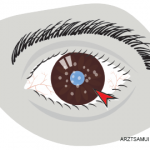The authors acknowledge that their study may have had selection bias because patients who are more reliable and compliant with treatment and follow-up are more likely to receive immunosuppressive drugs. Nonetheless, the message to rheumatologists is clear. As Dr. Thorne told The Rheumatologist via e-mail, “Timely referral to a uveitis specialist appears to results in better visual outcomes, and use of immunosuppressive drugs (predominantly methotrexate) conferred a reduced risk of moderate visual loss. Further studies investigating the emerging role of biologics will be important to better understand their role in preventing visual loss.”
Egla C. Rabinovich, MD, MPH, co-chief of the division of pediatric rheumatology at Duke University School of Medicine in Durham, N. C., was not involved with the research, but reviewed the study to discuss it with The Rheumatologist. She emphasizes that uveitis is a serious disease that results in scarring in the eye and vision loss. She explains, “Some doctors and families have trouble getting their minds around the fact that this is a chronic disease. We shouldn’t be afraid of using immunomodulatory therapies in children to treat their uveitis.”
Dr. Pullen is a medical writer based in the Chicago area.
Reference


